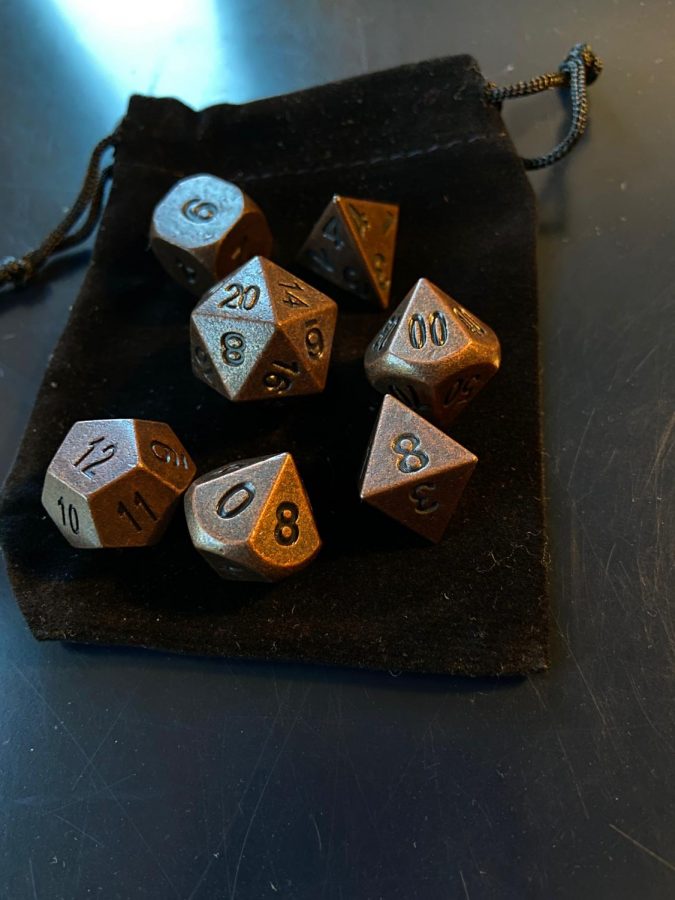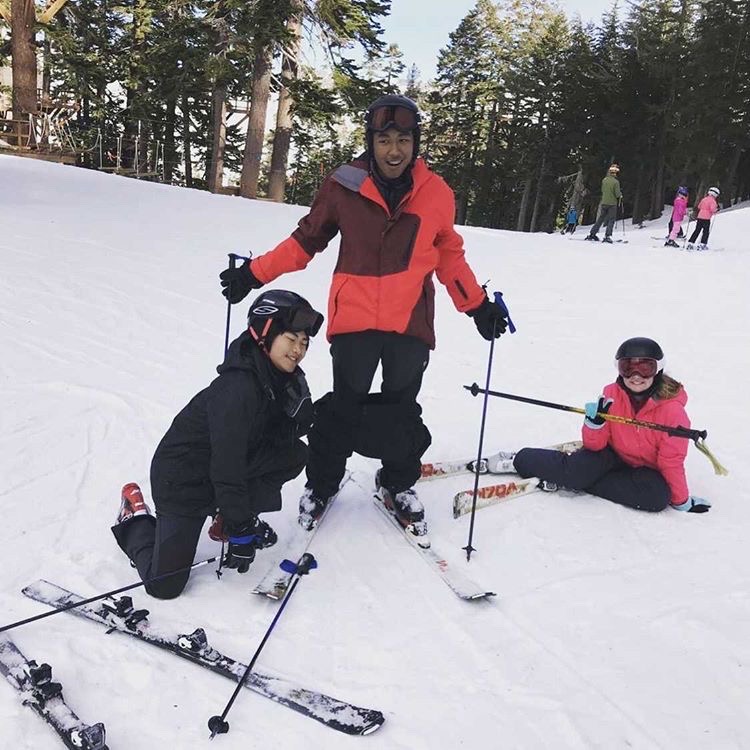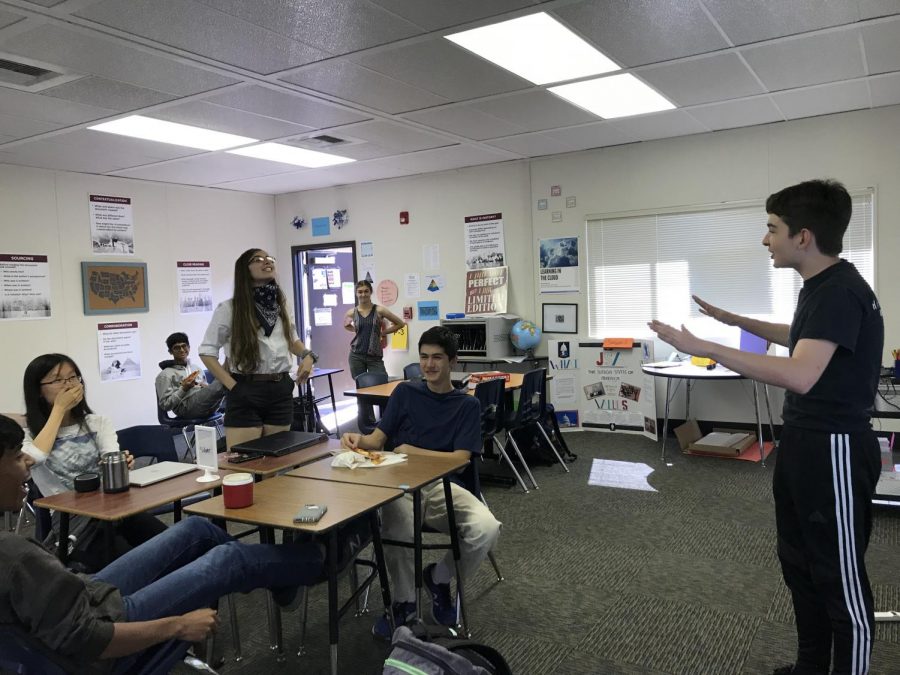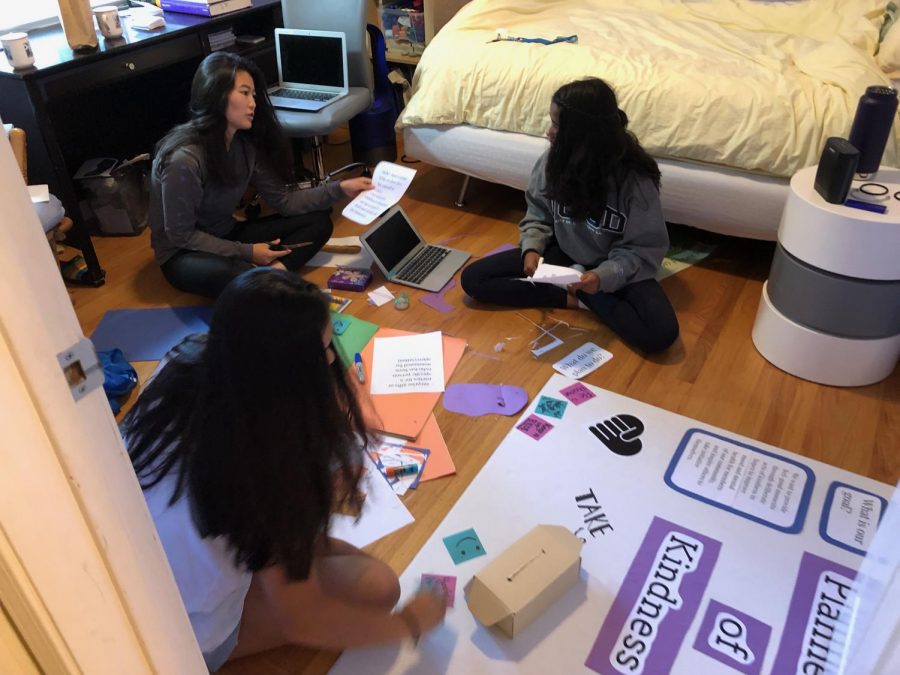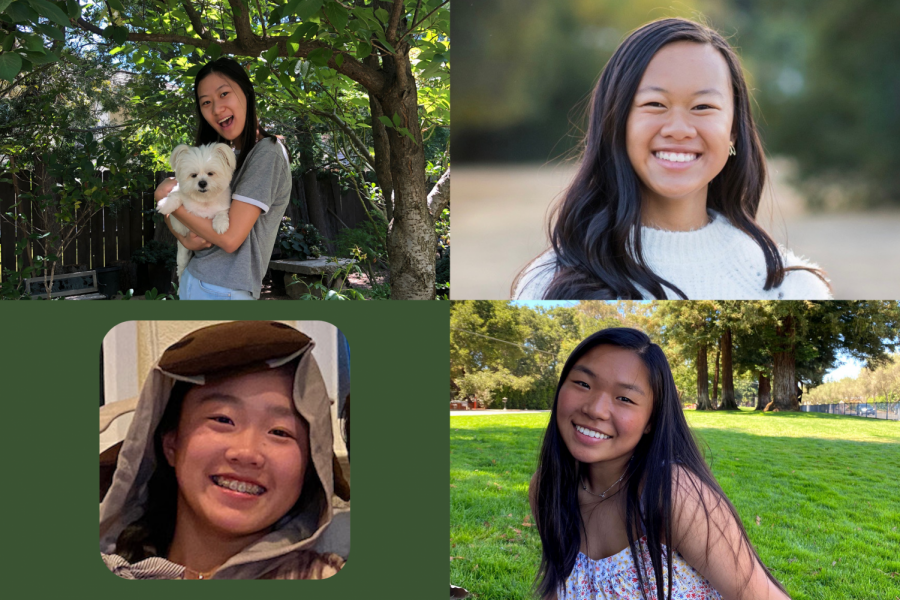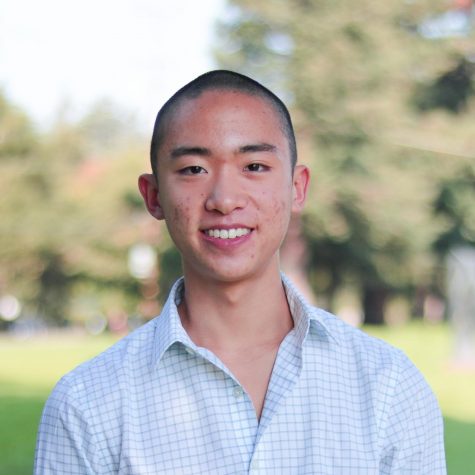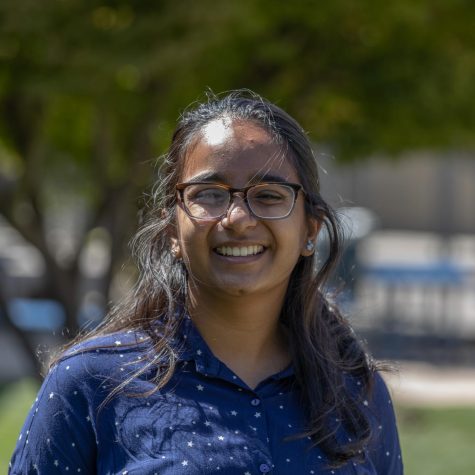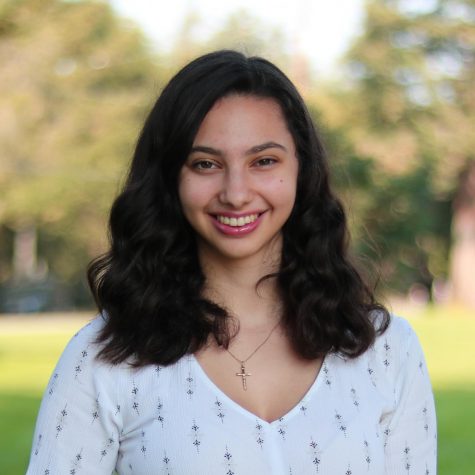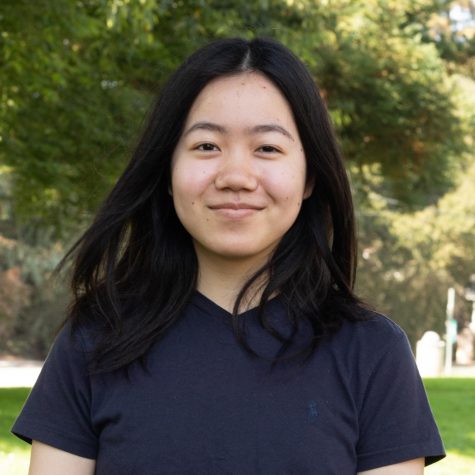From dissecting mathematical proofs as a group to immersing members in a mythical realm of adventure, Los Altos clubs are redefining Zoom class fatigue into an opportunity for all students to get invested in their interests and the school community.
Didn’t attend Club Day? Talon’s got you covered!
October 13, 2020
Although many students have struggled to find a sense of community during distance learning, over 90 student-led clubs will hopefully help everyone feel a little less isolated and inspire new passions this year. Continue reading to get the scoop on a handful of the clubs on campus dedicated to helping students virtually connect.
D&D: Not just for nerds
These unusual die are just a tiny facet of the endlessly imaginative game Dungeons and Dragons Club founder sophomore Nick Sapalaran hopes to promote amongst the student body. Enthusiasts and newcomers alike are able to join the online servers set up by the club and just enjoy the never ending twists and turns of this magical experience.
Sophomore Nick Sapalaran, founder and President of the Dungeons and Dragons (D&D) Club, insists that their club isn’t just for nerds.
“Well okay, I guess we’re majority nerds,” they said. “But anybody else is welcome to join; it doesn’t really matter who you are — whoever likes fantasy and role-playing.”
Luckily for the D&D not-nerds, Nick, who started the club last year, doesn’t anticipate distance learning posing much of a problem for the club; in fact, D&D has actually grown in size this year.
For those unfamiliar with D&D, the game doesn’t require many physical objects — just character sheets and dice, both of which can be found online on D&D websites.
For those completely unfamiliar with D&D, it’s a role-playing and adventure game where players go on imaginary “quests” in teams, led by a “dungeon master” in a fantasy setting — confusing, yes, but Nick says that new players tend to pick it up after a couple of games.
“The thing with D&D is that a lot of it is theater of the mind,” Nick said. “You don’t necessarily need to look at something to be able to play, but it’s obviously a lot more fun in real life.”
“Basically D&D’s just theater improv, but a board game,” sophomore Logan Kim, a new club member, said. “The rules are there as kind of a skeleton, but really you can do whatever you want.”
Logan said that he’s drawn to the game precisely because it’s so open-ended.
Nick did mention that one challenge they foresee is communicating and coordinating with club members; it can be hard to get people to meet at lunch because they’re at home, and everybody has extracurriculars and homework to do, so it can be difficult to find time to play.
Typically, the group would play Thursdays at lunch in science teacher Heather Laederich’s room (Nick said that in addition to being one of their favorite teachers, Laederich is well endowed with “big tables” in her classroom, which are handy for D&D). But unfortunately, those Thursday meetings have since been scrapped in favor of a solution more suited to distance learning.
Nick appointed five dungeon masters — “DMs,” they called them, with a certain swagger — to lead and host games every day of the week on the club Discord server, hoping that it’ll be easier for club members to find time to enjoy the game.
Logan, as a dedicated DM himself (he once spent three weeks devising a campaign and storyline), said that the hardest part of the job is to encourage new players to use their imaginations.
“It’s very difficult to get people to improvise because they don’t want to disrupt the continuity of the world,” he said. “But the thing is if they break that continuity, I can always reshape it as the DM.”
According to Logan, many of the game’s best moments come from the imaginative and unexpected twists each player contributes to the storyline. He provided examples of these instances, although most were “not safe for work.” But that’s what the game’s all about, he said — just having fun.
“I absolutely love D&D, and I love seeing other people also love D&D,” Nick said. “For me, it’s the role-playing and story-telling aspects of D&D that I really enjoy. I find it really fun to imagine myself as a cool fictional character fighting monsters, solving puzzles and also getting attached to a story.”
Nick reiterated that the club is open to anybody: nerds and not-nerds, people who know the rules and people who don’t.
“Experience doesn’t really matter for our club,” Nick said. “Our members are super friendly in general, so even if you don’t play, we’d be happy to teach you.”
Logan — after showing off an impressive collection of D&D dice — did poke some fun at his fellow D&Ders.
“It’s a very nerdy game,” he said. “There’s really not much else to say about it. We’re a bunch of nerds.”
Behind the scenes (BTS, if you must) of the Kpop and Anime Club
Vice President Dima Jones (center), President Maelle Allanic (right) and another club member shred down Tahoe’s snow-covered slopes on one of their unofficial Kpop and Anime Club bonding trips. Unconventional trips and events like these have bridged the divide between the Kpop stans and Anime fans even during a virtual school year.
Kpop and Anime Club President junior Maelle Allanic didn’t expect to organize a quarantine “Ponyo” party. She didn’t even want the Valorant tournament. Not to mention the ski trip, an excursion to Japantown or a dancing crew of BTS stans.
When she founded her club freshman year, Maelle never envisioned any of this, but she’s not disappointed by the turn of events. In fact, she’s rather proud.
Initially, Maelle started the club to simply connect with her friends who enjoyed Kpop, Anime or both. Over the last two years, however, it has evolved into a tight-knit community of over 60 members, divided in two by their interests.
“Envision this: In one half of the classroom, you have someone blaring their Kpop music and dancing, and on the other side, there’s a bunch of quiet people with headphones on watching Anime,” vice president junior Dima Jones said.
Despite how difficult quarantine has been, it’s given the club one advantage this year. Zoom breakout rooms have allowed the Kpop section to belt their beloved songs and practice choreography while allowing the Anime section their tranquil Anime soundtracks. Even with the inarguable differences between the cultures of Anime and Kpop, the two sections of the club intertwine harmoniously into one larger entity to support their club.
Their most frequent fundraiser, for example, featured members of all genders dressed up in cliché Anime schoolgirl outfits selling Ramune, a popular Japanese soda.
“The skirt, you know, it gets attention,” Dima said. “So people come over and buy something.”
“We were playing on the Anime trope of the schoolgirl,” Maelle said. “It wasn’t in a mean way, it was just for laughs.”
Through bonding experiences like this, the club is unified under the common goal of fostering a welcoming environment for students to learn about Kpop or Anime while enjoying one another’s company.
Before quarantine, club members took an array of informal field trips outside of the club’s premise, including an ice-skating excursion to Winter Lodge.
The trip was chaotic since, within the club, some members boasted their tournament-worthy skating skills while others had never even strapped on ice-skates before. In a sweet gesture, the more advanced skaters attempted to teach the newbies how to skate. While Maelle says they didn’t really succeed in these impromptu lessons, and many frequently fell onto the ice, at least it was entertaining and quality bonding time.
Since then, they’ve adjusted their bonding activities to accommodate for the virtual environment, including competitive games of Among Us and Gordon Ramsey-approved bake-offs.
Though things may change throughout quarantine, the Kpop and Anime Club will remain tight, through Anime movie screenings and Kpop concerts alike. Maybe they’ll even use one breakout room instead of two.
Junior State of America: Empowering student voices in politics
Courtesy Junior State of America Club
In an effort to help his peers feel more comfortable exploring their political opinions, senior Evan Fine circumnavigates topics from colonizing Antarctica to hypothetical new bill proposals with his fellow Junior State of America club members. The club’s focus on open-minded discussions allows students to reflect on their values and perspectives while moving past their political echo chamber.
Following the Brett Kavanaugh case and impeachment trials, senior Evan Fine observed a concerning pattern of behavior among his peers. Many were reluctant to speak up about their political opinions in fear that their views would be rejected by others.
Combining his interests in politics and debate, Evan started a chapter of the Junior State of America (JSA) — a national organization that educates students on how to be effective debaters and political leaders — in his junior year to provide a space for students to openly discuss their diverse perspectives.
“This is the time to have fair, unbiased discussions,” Evan said. “Students shy away not because the ‘thought police’ is going to get them, but because of the stigma of having a belief that doesn’t align with what most others believe. Every opinion should be listened to no matter how different it may be from yours.”
Evan realized that social media plays a large role in making students’ opinions more polarized by creating the belief that there is only one acceptable point of view on an issue.
“Social media is an echo chamber,” Evan said. “You see something you like, you hear more about it, then you don’t hear anything else. In my opinion, that creates incredibly closed-minded individuals.”
To combat this deep-rooted mentality, the club holds “think talks,” group discussions and political debates about current events. They also conduct congressional simulations to deliberate potential new bill proposals and world simulations to navigate foreign politics from the perspective of a world leader. Sophomore Shaurya Kadiyala found that these simulations provide an insight into the realistic, imperfect side of politics.
“The simulations gave a decent perspective into how messy it is to make and pass laws,” he said. “We were discussing the situation in a more joking way, but I think it does reflect what happens in the real world on some level.”
Through these activities, the club hopes to expose students to multiple viewpoints outside of their echo chamber and broaden their perspectives.
“In JSA, we maintain a light tone, so it’s a nice way to be able to discuss world issues without it getting too heavy or opinionated,” Shaurya said. “We stand up for our opinions in some aspects but also, we’re able to enjoy the little bit of diversity there is between our different ideologies.”
From discussing the pros and cons of granting Washington, D.C., statehood to colonizing Antarctica, club members work together to explore the impacts of situations many would have never even considered. This free-flowing environment allows members to determine their own values and remain open-minded toward the ideas contributed by their peers.
“It has become almost a rarity to hear someone say, ‘I want to hear what you think about this,’” Evan said. “To be able to have that unfiltered conversation without putting your judgment first is critical.”
Evan’s mission is to create a supportive environment for students to gain awareness about the current political climate and think critically to discover their political opinions.
“A lot of people may think that politics and talking about news is very rigid and boring, which for the most part, it is,” Evan said. “My personal goal in JSA is to make that a bit more exciting and add the proper amount of healthy chaos and thoughtfulness to provoke deep discussion.”
Proofing math can be fun
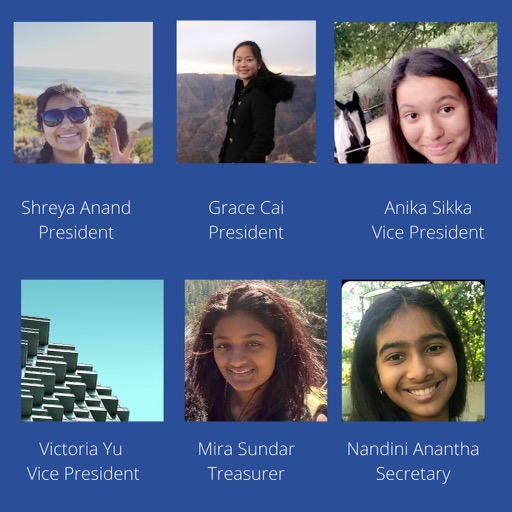
Courtesy Mathematical Proofs Club
The Mathematical Proofs Club, founded by an all-female leadership team, aims to erase the stigma around the subject of math. Through discussions and puzzle-solving, the club hopes to create an open environment for students to simply explore confusing mathematical concepts without grades tied into the process.
For many, math class means counting … counting down the minutes until the bell. But sophomores Grace Cai and Shreya Anand, Co-Presidents of the Mathematical Proofs Club, say that’s the result of rushed learning and textbook memorization.
“In school, especially in honors and AP classes, we’re always trying to just get through the material,” Shreya said. “If we’re interested in a certain chapter in the textbook, we very rarely get the opportunity to go in-depth.”
Enter the Mathematical Proofs Club, a club dedicated solely to math proofs and logic puzzles. Daunting? Maybe. But Grace and Shreya hope that through solving these problems together, club members will be able to really understand what they’re learning and actually enjoy mathematics.
Although the two are still working out all the kinks, the basis of the club will be presenting and dissecting proofs as a group, starting from simpler geometric topics and progressing toward more complex theories members want to explore.
“There are not that many proofs in the school curriculum, so we aren’t necessarily taught how to write our own or think logically for ourselves,” Grace said. “Last year in Algebra II Honors, it was difficult to understand everything without a solid proof behind it. Learning proofs can really help you get all the content.”
Grace and Shreya, who both plan on studying in STEM fields, hope that they can share their passion for mathematics with other club members and show underrepresented student groups that math isn’t exclusive.
“A lot of the dislike for math, or STEM, tends to come from insecurity,” Shreya said. “Our club is completely female-run, and that demographic is generally not what you see in a math class. Many people get scared away from these subjects because there isn’t enough representation of their community, so we want to show members that it’s possible to be successful in them.”
Grace, who takes a mathematical proofs class outside of school, said that as students who are passionate about the subject, she and Shreya hope to facilitate a safe environment for club members to share ideas and experiment with their reasoning sans judgment.
While both are in high-level math classes this school year, they stressed that the club is open to students of all skill levels.
“Nobody’s math class should define them,” Grace said. “Because math classes are really about whether you can pass the test and get to the next level.”
Shreya agreed, adding that there’s much more to math than getting a passing grade.
“The uniqueness of math is that even though there may only be one final, definitive solution, there are so many creative ways you can get there,” Shreya said.
Needless to say, Grace and Shreya hope that their club members will be doing lots of counting … counting down the days until the next club meeting.
PAK away negativity, choose kindness instead
Vice President Katherine Lai (left) as well as Co-Presidents Jeannette Wang (front) and Eesha Palasamudrum (right) are shown preparing Planned Acts of Kindess (PAK) for Club Day back in 2019. Although they started PAK in middle school, the three have returned to their simple mission of making the days of their peers a little brighter, expanding this year towards helping students manage their mental health.
Middle school is quintessentially an awkward era. With a little bit of help, however, students can be guided to try and be more consciously kind to their community despite otherwise slipping into a more self-centered state. Luckily, a couple of years ago, today’s Planned Acts of Kindness (PAK) Co-Presidents Jeannette Wang and Eesha Palasamudrum were given that exact support.
During their time at Egan Junior High School, Jeannette and Eesha were inspired by their physical education teacher Can Huynh. Huynh emphasized kindness and empathy, encouraging students to apply that attitude in all parts of their lives, from teachers to fellow students to random people on the street. These lectures urged Jeannette and Eesha to try and improve the Egan community’s mindset as a whole with random acts of kindness.
With Huynh’s help, Jeannette and Eesha, along with three of their friends, began the original PAK. Arguably, their most memorable contribution to the campus came right at the end of their eighth grade year. Jeannette used her position as a teacher assistant to sneak into the teachers’ rooms and put a thank you note made by the PAK team into each teacher’s box, hopefully without anyone noticing.
“We saw the big impact of doing something so simple, just writing a thank you note, or receiving one,” Jeannette said. “It can really make your day better.”
When they entered Los Altos High School, the club disbanded, but not for long. Near the end of their freshman year, Jeannette and Eesha were inspired to revitalize the club when Jeannette realized the impact PAK had, not just on the community, but on her as well.
“I thought to myself, ‘Wow, I think I’m actually becoming a worse person,’” Jeannette said. “When you first start high school, there’s so much going on that it’s very easy to just think, ‘Okay, I’m just gonna get through today,’ and not worry about other people. Having PAK was a constant reminder to want to try to be a better person and improve yourself.”
When they first started the club last year, it was a smaller operation with a similar agenda to their time at Egan. Club members would sometimes hand out jars of compliments to others with the hope of brightening their day.
However, since quarantine started, holding the same in-person events has proved a little more difficult. Despite this challenge, Jeannette and Eesha are undeterred in their goal to spread kindness even through the smallest of ways.
“Part of being kind is just appreciating the little things — finding the beauty in everything — and then maybe taking that and showing it to someone else,” Eesha said. “I think you can find kindness anywhere in the world; you just have to look for it.”
This year, Eesha and Jeannette have shifted PAK’s mission to focus on mental health and self-care. For Eesha, self-care isn’t just about self-pampering or relaxing, but also re-evaluating how we treat ourselves.
“Sometimes it’s so hard to find that energy just to be kind to yourself, it’s too much to have to be kind to others as well,” Eesha said. “At some point, you need to learn to take care of yourself before you can take care of everyone around you.”
Due to the circumstances, PAK hopes to encourage interpersonal connections between students and help them maintain mental health this year, urging people to just be kind to themselves. They plan on organizing activities like mental health seminars and a program matching random students across LAHS to foster connection. Ultimately, when times get hard, especially during the pandemic, kindness is just the best option.
“Kindness is something positive, so no matter what you define as being kind, if you try to achieve that, it’s something that’s helping everyone,” Jeannette said.
Be Okay Club: It’s okay to not be okay
President junior Trinity Bang and the rest of Be Okay’s leadership team know the feeling of academic pressure all too well. Luckily, they’ve developed some techniques to minimize if not overcome that stress and hope to foster a relaxing environment for members to unwind.
The Be Okay Club’s goal is to help spread awareness about these different states of mental health as well as how to take care of one’s well-being. However, there are certain states of mental health that a club or activity cannot remedy. In these cases, it is vital that more serious issues be addressed through formal resources such as CHAC therapists.
Within the first few weeks of this year, Be Okay Club President junior Trinity Bang’s mental state suffered under the pressure of staying on top of her workload and keeping her grades up. Recognizing that others felt the same way, she started the Be Okay Club to spread mental health awareness and help students prioritize their well-being.
“It was based on the idea that you shouldn’t have to be at your 100 percent all of the time,” Trinity said. “It is an unreasonable and irrational concept that is unfortunately forced on a lot of teenagers nowadays by their parents, friends and school.”
Everyday interactions between students have become limited due to the social isolation brought on by the pandemic, causing abnormal feelings in students.
“I think it’s the little things you don’t take into consideration like seeing people in the halls, meeting people in groups and just interacting in person,” Vice President Taylor Nguyen said.
Distance learning has made it difficult for students to balance their social and academic lives since they are tied to a computer screen for hours each day. In Taylor’s experience, this imbalance often leads students to overwork themselves.
“I feel like it’s a lot harder to chill nowadays than people think,” Taylor said. “There’s so much going on. We can all work on it and get better at it.”
Trinity wishes that she was taught the importance of prioritizing her well-being before being faced with high levels of pressure and stress. Since many of her club members are underclassmen, Trinity seeks to provide an uplifting environment for them to talk openly about their mental health.
“I wish I knew about [the importance of mental health] when I was younger and how to properly take care of it because honestly, I wasn’t really aware of it,” Trinity said.
After learning more about how to handle the pressures in her life, the approach that has worked for Trinity involves finding what brings you joy and being more mindful of those positives.
“Being more aware of the small [positive] things that happen throughout your day may help you cope with your stress,” Trinity said.
Over time, Trinity has discovered ways to brighten her own mood in the midst of challenges, like hanging out with her family, sleeping and doing art.
“They’re things that I’ve always enjoyed, but I wasn’t fully aware of how they affected me until my mental health wasn’t as good as it used to be,” Trinity said.
When school begins in-person, she hopes to host lunch activities that will help students find joy in activities such as making personalized stickers and doodling.
Since the club can’t host these activities until in-person learning, they plan to focus on important mental health topics such as depression and suicidal thoughts through Instagram posts to raise awareness. They also hope to use their social media platform to fundraise for nonprofit organizations supporting mental health initiatives.
Regardless of the circumstances, Trinity has a clear vision to ensure that students receive the support they need when they’re struggling.
“I want to create a safe space for people to be able to take care of their stress, pressure and mental health properly,” Trinity said. “But also know that it’s okay to be stressed and to feel pressure. You shouldn’t be expected to be at your best 100 percent of the time.”


